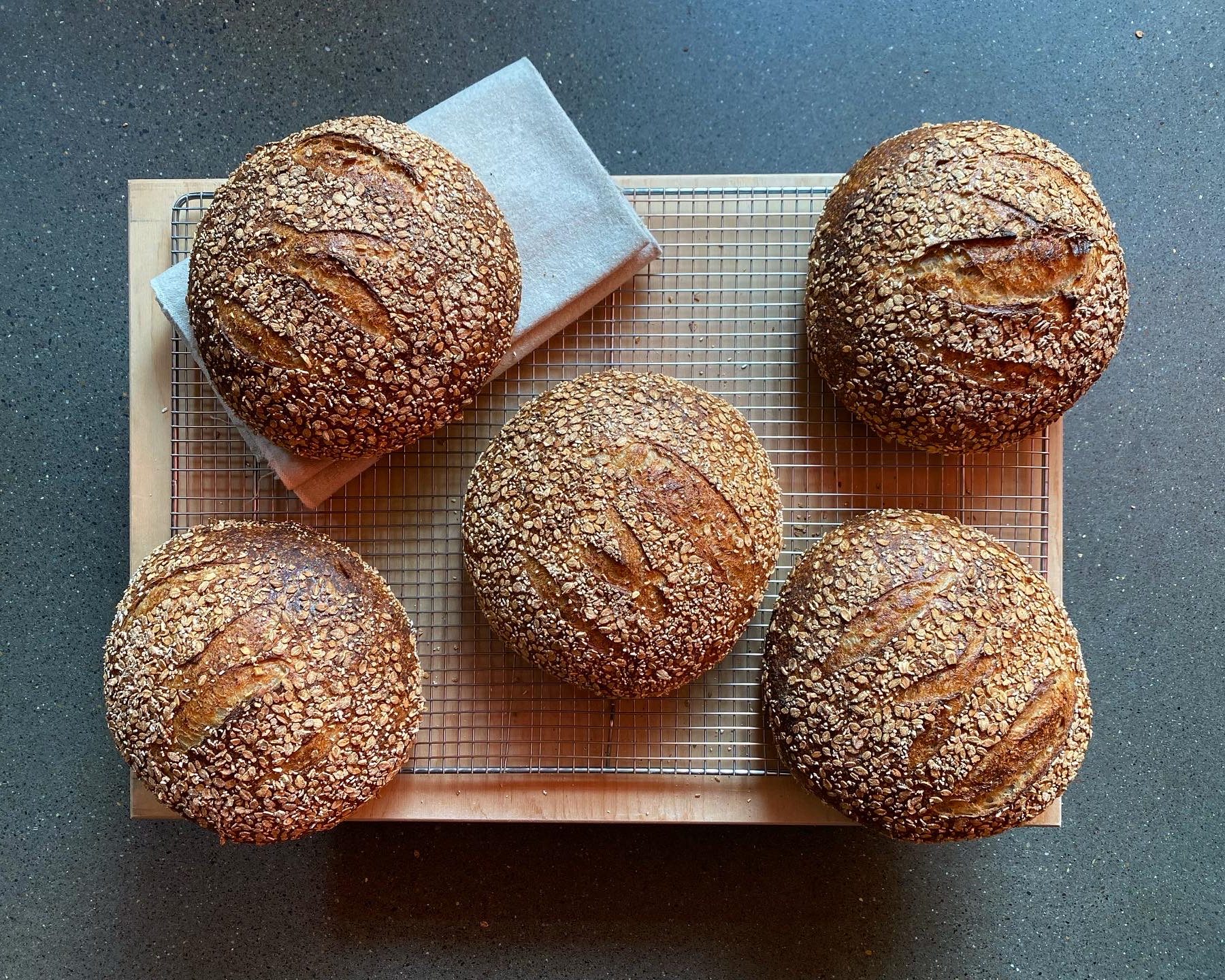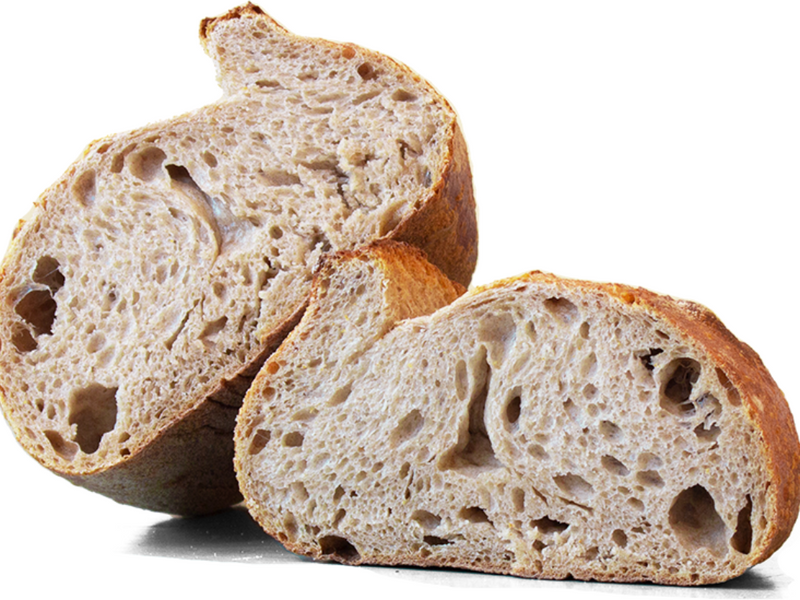IS SOURDOUGH BREAD A DIABETIC’S DELIGHT? Sourdough bread can be a good option for diabetics due to its lower glycemic index. It helps in managing blood sugar levels effectively.
Sourdough bread, a fermented type of bread, has gained popularity for its potential health benefits. For diabetics, managing blood sugar levels is crucial, and choosing the right type of bread can make a significant difference. Sourdough bread has a lower glycemic index compared to regular bread, which means it causes a slower and steadier rise in blood sugar levels.
This can be beneficial for individuals with diabetes in maintaining stable glucose levels throughout the day. Additionally, sourdough bread contains beneficial bacteria that may help improve gut health and digestion, further supporting overall well-being for diabetics.

Credit: edsbred.com
The Rise Of Sourdough Bread
Sourdough bread has gained popularity in recent years as people become more conscious of their health and seek out traditional, artisanal bread options. With its unique tangy flavor and chewy texture, sourdough bread has become a staple in many households. But what exactly is sourdough bread, and is it a good option for individuals with diabetes?
History Of Sourdough Bread
Sourdough bread dates back to ancient civilizations, where it was a staple food due to its simple ingredients and the natural fermentation process. The earliest recorded use of sourdough bread can be traced back to ancient Egypt, where it was made using naturally occurring wild yeast and bacteria. This traditional method of bread-making has been passed down through generations, with each culture adding its own unique twist to the process. Today, sourdough bread continues to be cherished for its rich history and distinctive taste.
Health Benefits Of Sourdough Bread
Sourdough bread offers several health benefits that make it a favorable choice, especially for individuals with diabetes. The fermentation process involved in making sourdough bread helps break down the carbohydrates and gluten, making it easier to digest. This can lead to a lower impact on blood sugar levels, making it a suitable option for those managing diabetes. Additionally, sourdough bread contains a higher concentration of nutrients such as vitamins and minerals, compared to conventional bread. It also has a lower glycemic index, which can help regulate blood sugar levels more effectively.
Understanding Diabetes
Diabetes is a long-term illness that alters your body’s ability to metabolize glucose or blood sugar. There are two main types of diabetes – type 1 and type 2. In type 1 diabetes, the body doesn’t produce insulin, whereas in type 2 diabetes, the body doesn’t use insulin properly. Both kinds have the potential to raise blood sugar levels, which, if left unchecked, can have major negative effects on health.
Types Of Diabetes
Diabetes comes in two main forms: type 1 and type 2. Type 1 diabetes is an autoimmune condition where the immune system attacks and destroys insulin-producing cells in the pancreas. On the other hand, type 2 diabetes occurs when the body becomes resistant to insulin or doesn’t produce enough insulin to maintain normal blood glucose levels.
Impact Of Diet On Diabetes
Diet plays a crucial role in managing diabetes. For individuals with diabetes, it’s essential to monitor carbohydrate intake, as carbohydrates directly affect blood sugar levels. Fiber-rich and low-glycemic index foods, such as whole grains, fruits, and vegetables, can help stabilize blood sugar levels. Additionally, consuming lean proteins and healthy fats can also contribute to better blood sugar control.
Nutritional Profile Of Sourdough Bread
Sourdough bread is a popular choice for many people, including those with diabetes, due to its unique nutritional profile. Understanding the nutritional content of sourdough bread can help individuals make informed decisions about including it in their diet. Let’s delve into the nutritional profile of sourdough bread to see how it can be beneficial for those managing diabetes.
Carbohydrates In Sourdough Bread
Sourdough bread typically contains fewer carbohydrates than regular bread, which can be beneficial for individuals with diabetes. The fermentation process of sourdough bread breaks down some of the carbohydrates, making it easier for the body to digest and absorb, resulting in a lower impact on blood sugar levels.
Fiber Content Of Sourdough Bread
Sourdough bread is also known for its higher fiber content compared to other types of bread. Fiber plays a crucial role in managing blood sugar levels as it slows down the absorption of glucose in the body. This can help prevent spikes in blood sugar, making sourdough bread a favorable choice for individuals with diabetes.
Glycemic Index And Sourdough Bread
Sourdough bread has gained popularity among health-conscious individuals, including those managing diabetes. One key aspect to consider when evaluating the impact of sourdough bread on blood sugar levels is its glycemic index. Understanding the glycemic index of sourdough bread can provide valuable insights into its suitability for diabetics.
Glycemic Index Explained
An indicator of how rapidly a food containing carbohydrates elevates blood sugar levels is the glycemic index (GI).
Foods with a high GI are rapidly digested and absorbed, leading to a rapid spike in blood sugar levels. Conversely, foods with a low GI are digested and absorbed more slowly, resulting in a gradual and steady increase in blood sugar levels.
Glycemic Index Of Sourdough Bread
When it comes to sourdough bread, its glycemic index can vary based on factors such as the fermentation process, flour type, and baking method. Generally, sourdough bread tends to have a lower glycemic index compared to conventional white or whole wheat bread. This is attributed to the lactic acid bacteria and wild yeast present in the sourdough starter, which help break down complex carbohydrates and gluten, resulting in a slower release of glucose into the bloodstream.
Sourdough Bread Vs. Regular Bread
Sourdough bread and regular bread are two popular choices, but what sets them apart? Let’s delve into the key differences between sourdough bread and regular bread.
Differences In Processing
Sourdough Bread: Fermented using a natural sourdough starter, allowing beneficial bacteria to predigest the flour.
Regular Bread: Made with commercial yeast, which leads to a quicker rise but lacks the fermentation process of sourdough.
Effect On Blood Sugar Levels
Sourdough Bread: Has a lower glycemic index compared to regular bread, resulting in slower blood sugar spikes.
Regular Bread: Can cause rapid spikes in blood sugar levels due to its higher glycemic index.

Credit: wildgrain.com
Sourdough Bread Recipes For Diabetics
Sourdough bread may be a good option for diabetics due to its lower glycemic index and potential positive impact on blood sugar levels. By using sourdough bread recipes specifically tailored for diabetics, individuals can enjoy this type of bread while managing their condition.
A healthcare expert should always be consulted before making any big dietary adjustments.
Low-carb Sourdough Options
Low-carb diets are often recommended for those with diabetes as they help regulate blood sugar levels. Fortunately, you can still enjoy sourdough bread even on a low-carb diet. Here are some low-carb sourdough options for you:
- Coconut flour sourdough bread
- Almond flour sourdough bread
- Psyllium husk sourdough bread
These recipes are perfect for those who want to enjoy sourdough bread without affecting their blood sugar levels. With the right ingredients, you can make delicious and healthy sourdough bread at home.
Incorporating Sourdough Into A Diabetic Diet
Sourdough bread is a great addition to a diabetic diet. It has a lower glycemic index than regular bread, meaning it doesn’t cause a rapid spike in blood sugar levels. Additionally, sourdough bread contains acetic acid, which has been shown to improve insulin sensitivity.
Here are some tips for incorporating sourdough into your diabetic diet:
- Stick to whole grain sourdough bread, which contains more fiber and nutrients than white sourdough bread.
- Pair your sourdough bread with protein and healthy fats, like avocado or almond butter, to slow down the absorption of carbohydrates.
- Avoid adding sugary spreads, like jam or honey, to your sourdough bread.
- Limit your portion size to one or two slices to avoid overconsuming carbohydrates.
Overall, sourdough bread can be a healthy and delicious addition to a diabetic diet. By choosing the right ingredients and pairing it with healthy foods, you can enjoy sourdough bread without affecting your blood sugar levels.
Expert Opinions On Sourdough Bread
Sourdough bread has gained popularity in recent years, but is it a good choice for diabetics? Let’s explore what nutritionists and endocrinologists have to say about incorporating sourdough bread into a diabetic diet.
Nutritionist Perspectives
Nutritionists generally agree that sourdough bread can be a better option for diabetics compared to traditional bread. This is because sourdough undergoes a fermentation process that may help reduce the glycemic index of the bread. The beneficial bacteria in sourdough can also improve digestion and nutrient absorption.
Endocrinologist Insights
Endocrinologists often recommend monitoring portion sizes and pairing sourdough bread with protein and healthy fats to minimize blood sugar spikes. While sourdough may offer some advantages, it’s important for diabetics to manage their carbohydrate intake and overall diet to maintain stable blood sugar levels.

Credit: www.youtube.com
Frequently Asked Questions
Does Sourdough Bread Raise Blood Sugar?
Sourdough bread has a lower impact on blood sugar compared to regular bread due to fermentation process.
Which Bread Is Best For Diabetics?
Whole grain bread is the best choice for diabetics due to its high fiber content and lower glycemic index. It supplies important nutrients and aids in blood sugar regulation.
What Is The Best Sourdough Bread For Diabetics?
The best sourdough bread for diabetics is whole grain sourdough. It has a lower glycemic index, which helps manage blood sugar levels. Look for sourdough bread with minimal added sugars and no refined flours for better control of diabetes.
Is Sourdough Bread High In Carbs?
Yes, sourdough bread is high in carbs due to the fermentation process that breaks down starches.
Conclusion
Incorporating sourdough bread into a diabetic diet can have numerous benefits. Its slower digestion and lower impact on blood sugar levels make it a favorable choice. Additionally, the presence of beneficial bacteria and increased nutrient absorption contribute to improved overall health.
With its delicious taste and potential health advantages, sourdough bread can be a valuable addition to a diabetic-friendly eating plan.


